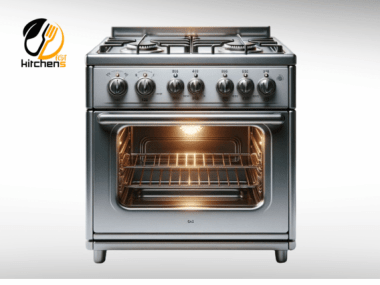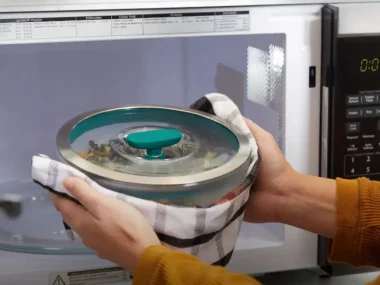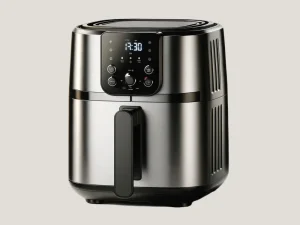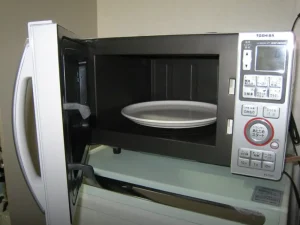Microwaves are super handy in the kitchen. They heat our food fast. But sometimes, they make a buzzing sound. You might wonder, is a buzzing microwave dangerous? It’s a good question because we all want to stay safe while cooking.
This common kitchen concern can unsettle many, but understanding the reasons behind the noise can ease your mind. Often, it’s not a sign of danger but indicates that your appliance might need maintenance or a quick fix.
This chat will examine why microwaves buzz, what risks they might mean, and how to stay safe. Let’s dive in and keep our kitchens safe!
What is Microwaving
Microwaving is a quick way to heat your food. It’s like using a magic box that makes your meal hot in minutes. You just put your food inside, press some buttons, and let it do its thing.

Inside the microwave, there are these tiny waves called microwaves. They’re different from the kind you surf on but the kind that gets your food hot. These waves bounce around and make the water in your food move fast. This moving heats your food from the inside out.
It’s perfect for when you’re hungry and don’t want to wait. Plus, it only heats your food, not the whole kitchen, which is fantastic. So, microwaving is all about getting your food ready quick and easy.
Common Sounds in Microwaves
Microwaves make a bunch of sounds, and it’s all good. When it’s running, you’ll hear a steady hum or buzz. That’s just the sound of it cooking your food with those microwaves. Plus, a fan inside keeps things relaxed so you might hear that, too.
Then there’s the clicking noise. You’ll hear this when you start it, or it’s done. It’s just the microwave’s saying, “Okay, let’s cook” or “All done!”
And if your microwave has a plate that spins, you’ll hear a soft sound, too. It’s the turntable moving so your food gets heated up just right, ensuring every bite is as warm as the last. These sounds are normal, just part of how your microwave does its thing.
Why Does My Microwave Make A Buzzing Noise?
When your microwave makes a buzzing sound, it’s like it’s trying to talk to you, but in appliance language. This buzzing noise can be a bit weird, and you’re right to wonder what’s going on.

So, here’s the scoop: a microwave buzzing is sometimes good news. Sometimes, it’s just the sound of electricity powering the magnetron. But if your microwave makes a loud buzzing noise than your usual sound, it might need a closer look. A few things could be causing the racket.
Magnetron
The magnetron is the heart of your microwave oven, the part that creates the microwaves to heat your food. If your microwave makes a buzzing noise, it’s often due to the magnetron. Here’s a simple breakdown:
- Magnetron Basics: When the magnetron is on, it’s normal to hear a humming or buzzing sound. This is just it doing its job, producing microwaves.
- Possible Issues: If the buzzing is louder than usual, the magnetron works harder than it should. This could be due to a problem with the microwave’s power supply or the magnetron itself starting to fail.
- What to Do: If the “microwave makes buzzing sound” more than usual, it could be time to check it out. Sometimes, it’s a simple fix, but other times, you might need a professional to take a look.
Cooling fan
Another reason your microwave might chat up a storm is the cooling fan. This part is like a little breeze that keeps things cool inside.
- Cooling Fan: Inside your microwave, a fan helps cool down the hot parts. It’s like a mini fan you use in summer.
- Why the Noise? If your microwave makes a loud buzzing noise, it could be the fan. Maybe it’s working extra hard, or something’s stuck in it. That’s when you hear the “microwave oven noise” ramp up.
- Fixing the Buzz: Checking if the fan’s blocked by dust or food bits can help. Cleaning it out might quiet things down. Keep an ear out for that “microwave makes a loud buzzing noise,” which is your cue to take action. But, if the buzz stays loud, it might need more love from someone who knows their way around microwaves.
Coupler
The coupler! It’s another sneaky reason your microwave might be sounding off. Let’s break it down:
- Coupler’s Role: The coupler is a little handshake between the turntable and the microwave. It helps the plate spin so your food heats up evenly.
- The Buzz: If your microwave makes a loud buzzing noise, peek at the coupler. It might be worn out or not sitting right, causing a fuss when it tries to spin.
- Fix the Noise: Sometimes, you can reseat the coupler or clean under the turntable to stop the noise. If the coupler looks broken, it might need replacing. It’s a simple part but super crucial for even cooking. Keep that “microwave makes loud buzzing noise” in check with a little coupler TLC.
Drive motor
And then, there’s the drive motor. This part is essential because it makes your microwave’s turntable go round and round.
- Drive Motor Basics: Imagine the drive motor as the legs of your microwave. They help it run, or in this case, spin your food so it cooks evenly.
- Buzzing Noise: If you’re hearing your microwave making a buzzing sound, the drive motor might be telling you it’s in trouble. It could be worn out or just stuck on something.
- What to Do: Checking if something’s blocking the turntable can help. The motor might wear out and need a change if it’s clear but still buzzing.
How to Choose the Right Microwave?
Safety should be at the forefront of your decision-making process when shopping for a new microwave. Here’s What to Look for in a New Microwave that’s as safe as it is functional.
Safe Microwave Features
- Child Lock: An essential feature for households with children. It prevents the microwave from being accidentally started, offering peace of mind to parents.
- Automatic Shutoff: This is an excellent feature that turns off the microwave if it thinks the food is done. It helps prevent food from getting too hot and causing problems.
- Cool-Touch Exterior: Make sure the outside of the microwave stays cool so you don’t burn your fingers when you touch the surface during or after use.
- Safety Certification: Look for a sticker or mark that shows the microwave passed safety tests by recognized safety standards, such as UL or ETL. This means it’s good to go and safe to use.
Cool Tech for Safe Microwaves:
- Inverter Tech: This helps cook food more evenly and keeps it from getting too hot. It’s a more innovative way to microwave.
- Sensor Cooking: The microwave determines how long to cook your food by checking how steamy it is. This means no more guessing and safer cooking.
- Smart Features: Some microwaves are so smart they connect to your phone. You can get alerts if you remember to close the door or leave it on too long.
Other features you should also look at
- Capacity and Size: Consider the internal space (cubic feet) versus the external dimensions to ensure it fits your counter space and meets your cooking needs.
- Wattage: Higher wattage means faster cooking times, but it also means more power consumption. Look for a balance that suits your patience and your energy bill.
- Ease of Use: Simple interfaces and intuitive controls can significantly enhance user experience. Touchpad controls should be responsive and easy to clean.
- Reliability and Warranty: Research the brand’s reputation for reliability and check the warranty length and coverage. This can save you headaches down the line.
When picking out a microwave, these features can make cooking safer and more accessible. Keep them in mind to find a good one!
Conclusion
Here! We just talked a lot about the beeps and hums your microwave makes. It’s good to know what these sounds mean, especially when deciphering if “Is a buzzing microwave dangerous? It helps you use your microwave better and spot problems early.
Microwaves are safe, so don’t stress too much. Just use them how the manual says, and you’ll be fine. But listening to your microwave can make it even safer. It’s like knowing when your car sounds weird, so you check it before anything wrong happens.
Here’s a tip: take care of your microwave. Clean it occasionally, check if anything looks weird or sounds off, and get help if something seems wrong. This helps it last longer and keeps your kitchen safe.
What You Can Do:
- Share your stories: Do you have any microwave stories or tips? Drop them in the comments. It’s cool to learn from each other.
- Stay in the loop: Like what you read? Hit subscribe. We’ve got lots of simple guides and tips to share.











